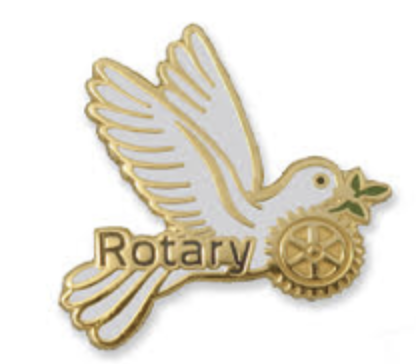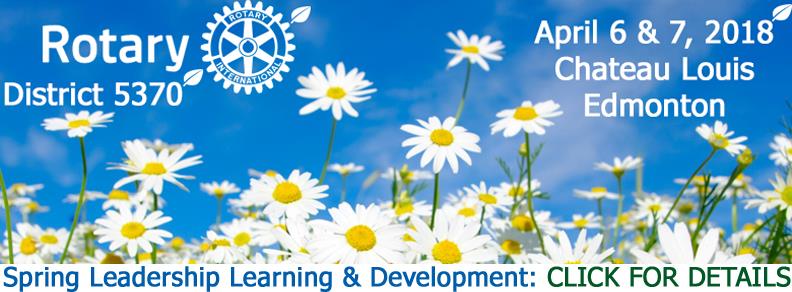
At its core, Rotary is about peace.
“Peace has been part of Rotary’s history for 115 years,” says PDG Ingrid Neitsch. “Peace permeates every aspect of Rotary.”
Ingrid, who chairs the District 5370 Peacebuilder Committee, points to the six peace conferences Ian Riseley hosted worldwide during his year as Rotary International president.
Each conference focused on how peace and conflict prevention/resolution was supported by Rotary’s other areas of focus: disease prevention and treatment, water and sanitation, maternal and child health, basic education and literacy, economic and community development, and protecting the environment which has recently become a seventh area of focus.
The Peacebuilder Committee grew out of an initiative during 2018-2019, when Ingrid was District Governor and our District was able to achieve a two-year designation as a Peacebuilder District.

“The District Peacebuilder Committee was a natural progression,” Ingrid says. “I believe Rotary’s peacebuilding work is now more important than ever before. Our committee joins a growing movement of concerned citizens from around the world committed to the advancement of peace education.”
For the District to achieve Peacebuilder status clubs, individual Rotarians, the District and some non-Rotarians committed to providing financial support to Rotary Peace Centers located at universities around the world.
During 2018-2019, there were six peace centers at universities in the United States, Japan, England, Australia, Sweden and Thailand. Since then, another centre was established at Makerere University in Kampala and recently RI announced that another will open in the Middle East.
Rotary Peace Fellows attend these university to earn master’s degrees or professional development certificates in peace and conflict resolution/prevention.
For the next academic year, 117 fellowships were awarded to individuals from 63 countries. Rotary Peace Fellowships are fully funded by The Rotary Foundation.
In recent years, two students endorsed by our District—John Lamming and Menasha Nikhanj—completed professional development certificates at Chulalongkorn University, Bangkok, Thailand.

The peacebuilding committee includes both Rotaractors and Rotarians, including PDG Jackie Hobal and DGE Donna Barrett.
“There is a diversity of voices and experience that members bring to this committee,” Ingrid says. “We have a few young people who have a deep commitment to peace.”
In February, which RI has designed as Peace and Conflict Prevention/Resolution Month, the committee announced its positive peace clubs initiative.
The purpose of positive peace clubs is to fulfil Rotary’s mission to advance world understanding, goodwill and peace. These clubs will be expected to establish a peace committee to promote peace education, donate US$100 to US$1,000 to support Rotary’s peace centres and meet two of several other criteria set out on the Peacebuilder page of the District website.
A positive peace club application form, a sample positive peace club certificate and a list of peacebuilding resources are also available.
“We hope every club will be involved in at least one aspect of peacebuilding,” Ingrid says. “We would like to see clubs apply a peacebuilding lens when selecting projects.”
Ingrid says that what District 5370 is doing is attracting the attention of Rotarians elsewhere, including those in leadership positions.
Both RI President Holger Knaack and PRIP Barry Rassin have praised the video on which Ingrid and three Rotaractors from the committee—Yvone Joubert, Miles Dykes and Shannon Peacocke—announced the positive peace clubs initiative.
RI Director Valarie Wafer plans to highlight the committee’s work as trendsetting during her next Director Dialogue at 5:00 p.m. MST on Wednesday, March 10, which will feature RI president-elect Shekhar Mehta and Peace Fellow Marie-Paule Attema.
Click here to register for this Director Dialogue.
Moving forward, the committee will continue to promote peace positive clubs and encourage peace education.
“We would love to see peace literacy or some kind of peace program in the curriculum to be taught as a skill,” Ingrid says. “For example, students could learn how to recognize and address aggressive behaviour in conversations.”


 Another topic about which Menasha now has a better understanding is human trafficking, which exists here in Canada.
Another topic about which Menasha now has a better understanding is human trafficking, which exists here in Canada.
 “For me, it is that we share values and follow the Four-Way Test, we collectively take action for a better world, and we are doing this together,” she said.
“For me, it is that we share values and follow the Four-Way Test, we collectively take action for a better world, and we are doing this together,” she said.

 A key District initiative for 2018-2019 was for the District to become a Peacebuilder District, which Ingrid announced during the District changeover event on June 11, 2018, and to sponsor a peace scholar.
A key District initiative for 2018-2019 was for the District to become a Peacebuilder District, which Ingrid announced during the District changeover event on June 11, 2018, and to sponsor a peace scholar.
 Donna says the assembly will provide “incoming leaders with the tools they need to ‘Be the Inspiration’ for their clubs.”
Donna says the assembly will provide “incoming leaders with the tools they need to ‘Be the Inspiration’ for their clubs.”
